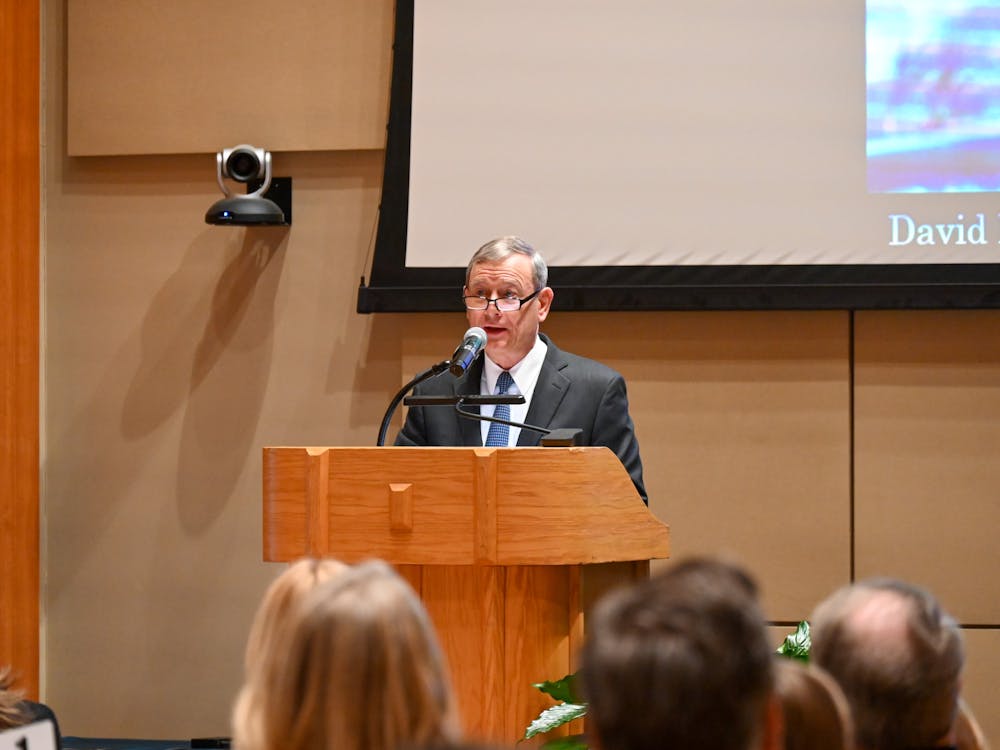Chief Justice John Roberts spoke Thursday at a private Duke Law ceremony honoring the late Sandra Day O’Connor, former associate justice of the U.S. Supreme Court.
Held at the Karsh Alumni and Visitors Center, the event also included remarks from School of Law Dean Kerry Abrams, Lisa Griffin, Candace M. Carroll and Leonard B. Simon distinguished professor of law, and Paul Grimm, director of the Bolch Judicial Institute and former U.S. district judge. The speakers addressed “the importance of the rule of law and O’Connor’s legacy and commitment to civic education.”
The Bolch Judicial Institute named O’Connor the recipient of the 2024 Bolch Prize for the Rule of Law in December 2023, days after her death due to complications of dementia. The award honors O’Connor’s judicial career and her contributions to civic education following her retirement in July 2005.
“Her most common piece of advice was just to get things done,” Griffin said of O’Connor in her opening remarks. She also characterized O’Connor as “vivid,” “generous” and “collaborative.”
Grimm delivered remarks emphasizing the qualities consistent among recipients of the Bolch Prize. To Grimm, recipients “reflect the same creativity and commitment to improving society through the rule of law.”
Roberts address
Roberts began his address by congratulating Duke and the BJI for awarding the prize to O’Connor, noting how he had met O’Connor 43 years ago while working for the Department of Justice where he “played a very minor role in helping her prepare for her confirmation hearings to join the Supreme Court.”
“She was on the bench for every one of my Supreme Court arguments, occasionally showing little regard for all that I had done to get it there,” he joked.
Roberts was initially nominated by President George W. Bush to fill the Supreme Court vacancy left by O’Connor’s retirement in 2005. However, Chief Justice William Rehnquist died in September 2005, causing Bush to withdraw the original nomination and instead nominate Roberts for Chief Justice. Roberts has served in the position since 2005, the first six months of which he served alongside O’Connor, which he called “very special.”
Roberts then proceeded to recount highlights from O’Connor’s life, alongside a slide deck of photographs from “private collections” of O’Connor and others throughout the years. Photos ranged from glimpses of her childhood to snapshots with various foreign dignitaries.
The photos included pictures throughout O’Connor’s career, which included service as a state senator in Arizona and then as an appellate judge. O’Connor was nominated for the Supreme Court by President Ronald Reagan and served as an associate justice from 1981 to 2006. O’Connor was the first woman to serve on the nation’s highest court.
One of the last photos he showed, which he called his favorite, was that of a smiling O’Connor laying her hand on the shoulder of a young girl who was looking into a computer. He compared it to a photo he showed earlier of O’Connor looking into a much larger and older computer.
“The opportunities for the young girl in the picture had changed just as much in the intervening years as technology, in no small part due to the woman standing behind her,” Roberts said.
He noted that, following her retirement from the Court in 2006, O’Connor continued to sit on federal courts across the country “to an extent few justices have since the earliest days of the republic,” traveled the world to inspire others and expanded her reach by “going digital” and launched iCivics, a nonprofit which offers civic education games and resources for teachers to use in the classroom.
“Sandra Day O’Connor expanded the public image of what it meant to look like a judge,” Roberts said. “She sounded the alarm about the growing lack of appreciation of what it means to be a citizen — she launched iCivics to do something about that.”
Bolch Prize for the Rule of Law
O’Connor’s son Scott accepted the prize on her behalf. Scott reflected on the fact that even with the success of iCivics, O’Connor “never took a dime.”
“She did it because it was the right thing to do,” he said. “And that’s how she was wired.”
“More than any person, she carried the message here and abroad that we need to treasure the rights that are guaranteed by our Constitution and recognize that judicial independence and the rule of law are tremendously hard to create, and easier than most people imagined to damage or destroy,” he continued, also emphasizing the uniquely global scale of O’Connor’s activism.

Get The Chronicle straight to your inbox
Sign up for our weekly newsletter. Cancel at any time.
BJI founder Susan Bolch gave closing remarks at the ceremony, emphasizing how the Bolch Prize seeks to “shine a light on those who dedicate their lives to protecting and strengthening the rule of law.”
“My hope is that each of us will leave this evening inspired and determined to play our part to be educators and to continuously seek opportunities to be educated about our system of government, our responsibilities as citizens and the ways in which we can support tomorrow’s leaders,” Bolch said.
Former recipients of the prize include Senior Circuit Judge John Wallace, Margaret Marshall, former chief justice of the Massachusetts Supreme Judicial Court, Dikgang Moseneke, former deputy chief justice of South Africa, and Anthony Kennedy, former associate justice of the U.S. Supreme Court.
The BJI describes O’Connor’s reputation as a “moderate voice of the Court and a model of pragmatism and civility.”
“There is no more important work than deepening young people’s engagement in our nation … I hope that I have inspired young people about civic engagement and helped pave the pathway for women who may have faced obstacles pursuing their careers,” O’Connor wrote in a 2018 letter announcing her dementia diagnosis and retirement from public life.
Editor's Note: This story was updated Thursday evening to include details from the event.

Michael Austin is a Trinity junior and managing editor of The Chronicle's 120th volume.

Jazper Lu is a Trinity senior and centennial/elections editor for The Chronicle's 120th volume. He was previously managing editor for Volume 119.

